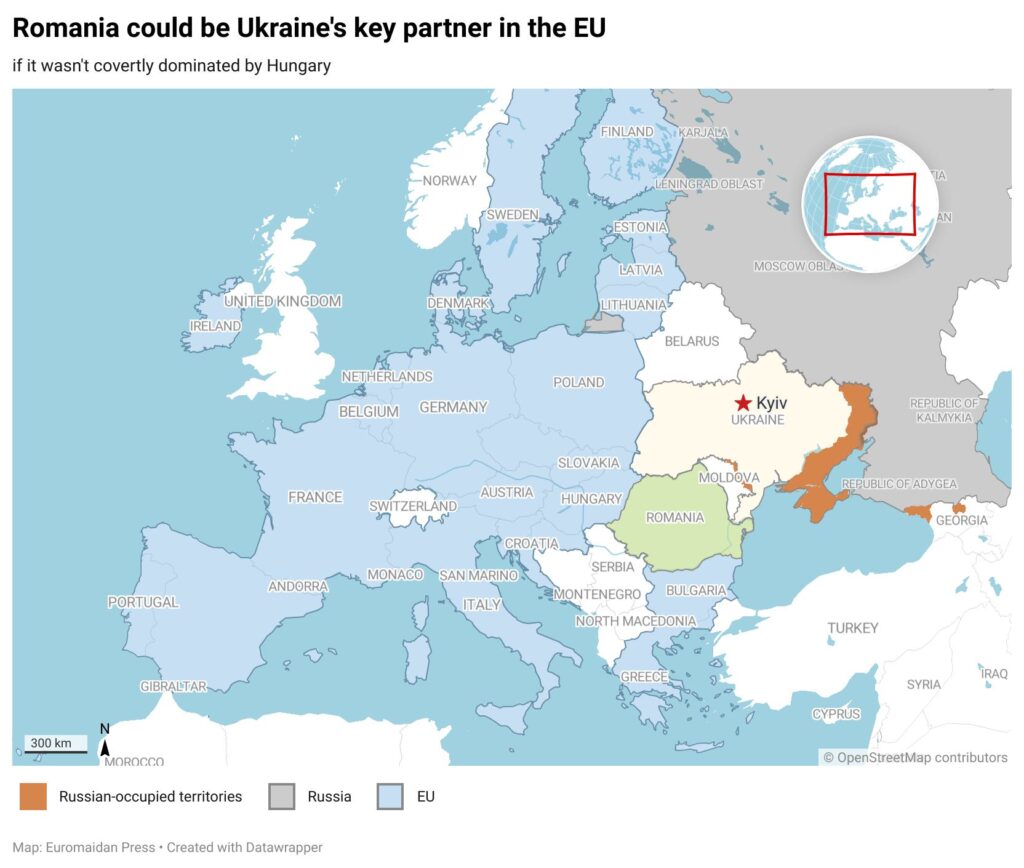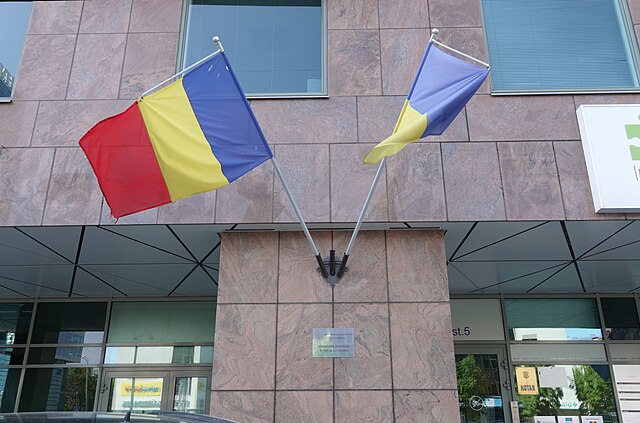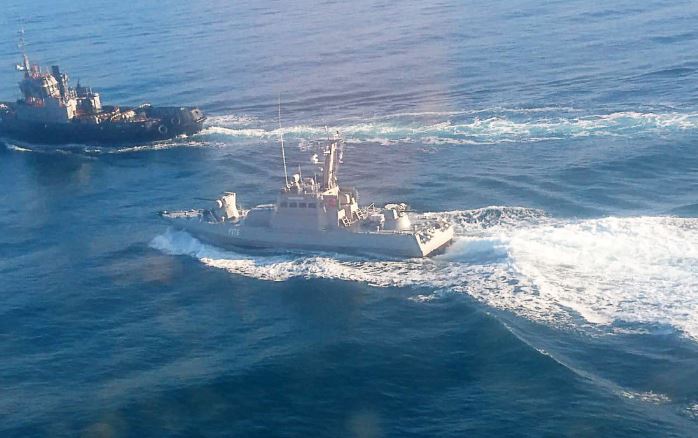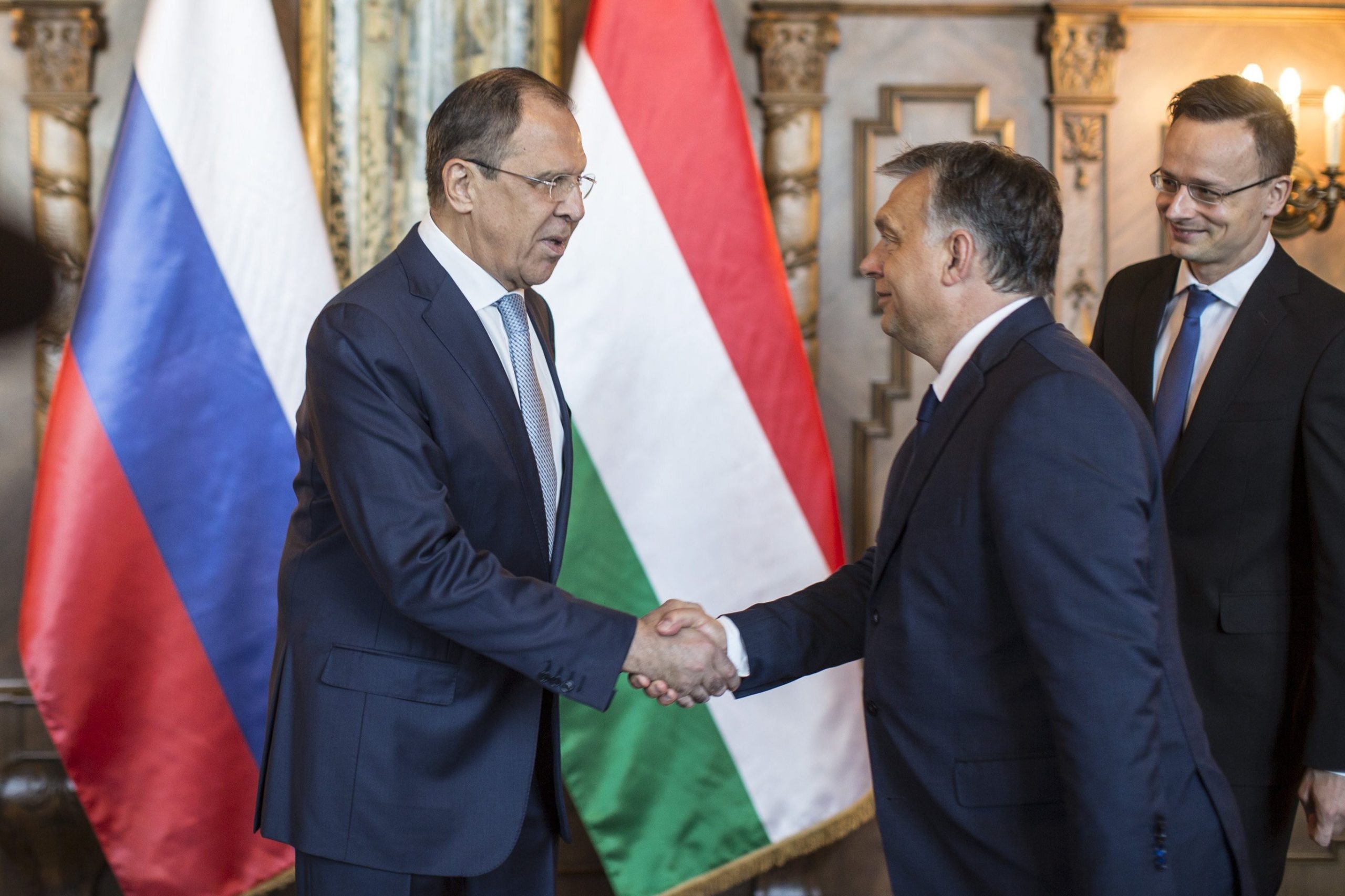Romania and Ukraine share over 600 kilometers of border and parallel paths of post-communist transformation. Romania joined NATO in 2004 and the EU in 2007, making it Ukraine's obvious champion for European integration.
But when Ukraine needs Romanian support, there's silence and Romanian journalist Romeo Couți explains why it is so. In an interview with Euromaidan Press Couți noted: "Romania at this moment is almost entirely dominated by Hungary."
The mechanism? A Hungarian minority party that holds permanent veto power over Romanian policy—and takes orders from Budapest.
Why Romania matters for Ukraine
Romania's position makes it Ukraine's natural bridge to Europe. The countries share over 600 kilometers of border—longer than Poland's frontier with Ukraine. Romania's NATO membership since 2004 and EU membership since 2007 mean it knows the accession process. Its location links Ukraine to Central Europe.
Romania already traveled Ukraine's path. It reformed post-communist institutions, met Western standards, navigated EU accession, and joined NATO.
"Romania could be a link in the European path of both Moldova and Ukraine," Couți said.
Yet this partnership barely exists.

The silence when Ukraine needs support
"In any unpleasant or tense situation, there's silence from Kyiv and silence from Bucharest," Couți observed. "This type of silence shows there's no communication between the Romanian and Kyiv governments, which shouldn't be the case."
The silence appears everywhere cooperation should exist. Romanian minority issues in Ukraine get no joint diplomatic approach. Regional development shows no bilateral projects. EU integration lacks visible partnership. Security cooperation beyond NATO remains minimal.
"I think it's more about incompetence and lack of ability to develop common projects with Ukraine," Couți said. "Romania has some very good specialists in negotiation. I don't have information that anything natural and normal has developed between Romania and Ukraine outside the established framework from Brussels."
Romania only does what Brussels explicitly directs. Independent Romanian-Ukrainian cooperation? Blocked.
But the constraint runs deeper than incompetence. "Romania doesn't have an independent foreign policy—at this moment Romania is subordinated to Brussels," Couți said.
In reality, Romania answers to Brussels on paper and Budapest in practice.

How Hungary controls Romania
The control mechanism revealed itself at the UDMR congress in Cluj. The party—the Democratic Union of Hungarians in Romania—represents Romania's Hungarian minority of approximately 1 million people.
"Let's not forget what happened at that congress, where all high-ranking Romanian officials stood before Viktor Orbán," Couți recounted. Romania's Prime Minister and other top officials attended on their own territory—not as equals but as supplicants.
The symbolic moment: attendees sang the Székely anthem, associated with Hungarian territorial claims in Romania.
"As head of government, it's not acceptable to attend moments with so much symbolism—I'm referring to the singing of the Székely anthem," Couți said. "It's not that the Prime Minister is an uninspired leader. It's that a foundational institution of the Romanian state, the government and the office of the Prime Minister, was humiliated."
When Hungary finally approved Romanian Schengen membership after years of blocking, Couți asked: "I don't even know what Romania offered for the vote Hungary gave when we joined Schengen. What was the deal?"
"Through these tactics, Hungary managed to break any desire for cooperation," he said.

The mechanism of control
The control runs on coalition math. Romania's Hungarian minority, concentrated in Transylvania, constitutes approximately 6% of the population. UDMR wins 5-7% in elections—enough to make or break governments.
UDMR has joined Romanian coalition governments repeatedly since 1996, spanning both left and right administrations.
"UDMR has a very strong position in Romania because it's eternally in the coalition of power," Couți said. "Kelemen Hunor is presented as a strong leader, taken up by the whole press, adulated, portrayed as a very well-prepared man."
UDMR can collapse any government by withdrawing. Budapest directs UDMR positions. UDMR threatens to leave if not followed. The government complies.
"Viktor Orbán succeeded—he has control in Romania through UDMR," Couți said.
For Ukraine, this creates an invisible veto. Any Romanian policy contradicting Hungarian interests gets blocked behind closed doors. The government simply doesn't propose it.

Hungarian territorial ambitions in Romania
"Hungary will take advantage of this situation to advance some territorial claims, because the traumas related to what the Treaty of Trianon meant for Hungary still drive policy today," Couți explained.
The 1920 Treaty of Trianon transferred Transylvania to Romania after World War I. Hungary lost approximately 72% of its pre-war territory. This century-old "trauma" still drives policy.
Trending Now
Current moves show the pattern. "Hungary is conducting intense negotiations to acquire land in Romania in the Sulina area, where—on the pretext of opening a port—Hungarian private companies, actually under government control, want to acquire land to open a port in Sulina," Couți revealed.

Based on the 1910 census. Administrative Hungary in green, autonomous Croatia-Slavonia grey.
Sulina sits where the Danube meets the Black Sea—strategic for commerce and military logistics.
"Together with China, Hungary has acquired land in the Trieste area at the sea, where a port has already been arranged," he added.
The pattern uses "economic" projects to establish territorial footholds—the same playbook Russia uses.
"Hungary doesn't want to establish itself as an element of peace negotiations," Couți warned. "Hungary wants to become a regional power only to impose some claims related to control of certain territories, even if it won't actually recover them physically."
"Let's not forget that Viktor Orbán has a fairly deep dispute with Ukraine, starting from formal issues like the language law and ending with territorial ones," Couți noted.
What Ukraine loses
Ukraine's natural EU champion has been neutralized.
"Romania doesn't have an independent foreign policy—at this moment Romania is subordinated to Brussels," Couți explained.
The reality is worse: Romania formally answers to Brussels but effectively takes orders from Budapest.
This matters for Ukraine. As neighbors sharing both a border and Hungarian pressure, Romania and Ukraine should be natural allies pushing back together against Orbán's obstruction. Instead, Hungary's control over Romania means Ukraine loses a critical partner precisely when needed most.
What they could accomplish together: Active lobbying for Ukraine's EU candidacy, bilateral security cooperation beyond NATO, cross-border infrastructure projects, and a united front against Hungarian vetoes. Romania's post-communist transformation offers practical lessons Ukraine needs.
What actually happens: Romania issues generic statements only when Brussels permits. Minimal bilateral engagement. Silence when Hungary objects.
For Ukraine, watching Romania under Budapest's control offers a disturbing preview of how Hungarian influence operates inside the EU institutions it seeks to join. Two countries facing the same opponent can't coordinate their defense because one has already been captured.
Hungary's control demonstrates that EU membership doesn't protect democratic institutions from capture. NATO partnership doesn't prevent it. Good intentions don't matter if mechanisms allow control.
If Hungary controls a full EU and NATO member this completely, what will it demand from Ukraine during accession? What permanent constraints will it embed?
The playbook Ukraine will face
Hungary refined this mechanism in Romania and will deploy it against Ukraine. Ukraine has an ethnic Hungarian population in Zakarpattia Oblast where Hungary already uses minority rights as leverage for political influence.
Once Ukraine enters EU structures, Hungary will have institutional tools to replicate the Romanian pattern. Budapest funds and directs an ethnic minority party, makes it essential to governing coalitions, then uses that coalition position to influence national policy. Any resistance gets framed as discrimination, invoking EU minority protection frameworks. The target country faces an impossible choice: accept foreign control or appear to violate minority rights.
This creates a trap where legitimate minority rights protections—which are essential and should be defended—get weaponized as tools of foreign influence. Ukraine's Hungarian community deserves genuine rights and representation. But those rights shouldn't come packaged with Budapest's political control, and protecting national sovereignty shouldn't require undermining minority protections.
Ukraine sees the playbook now. Romania learned too late. Ukraine can build defenses that protect both national independence and minority rights—if it distinguishes between the two before accession.
Why this matters beyond Romania
Hungary's control shows Ukraine's EU path faces obstacles beyond obvious vetoes. Budapest neutralized a potential ally from within. Even after Ukraine joins, Hungarian influence through minorities and coalition politics could limit support.
The obstacles aren't just Russian aggression and Western hesitation. They include control mechanisms that already neutralized potential allies inside European structures.
Will Ukraine build institutional defenses, or end up like Romania—formally sovereign, practically constrained, unable to support its interests when they conflict with Budapest?
"There are many unknowns," Couți said. "I see that the Ukrainian president is moving in an area where there's no turning back."
Romania's silence shows the stakes. Hungary's control shows the mechanism. Couți's analysis reveals that even Ukraine's natural allies may not help when needed—not because they don't want to, but because someone else holds the strings.
For Western policymakers supporting Ukraine's EU integration: membership alone doesn't guarantee independence. Democratic institutions can be captured. Hungary already demonstrated how.







